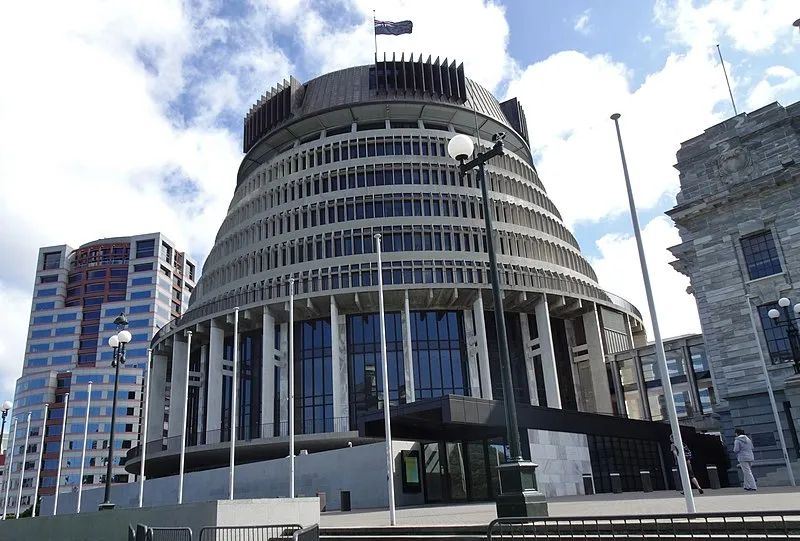Table of Contents
Mark Blackham and Emily Mingins
Victoria University of Wellington
Although there are now more farmers than teachers in the in the 54th Parliament, office work, politics and humanities education are the dominant backgrounds of MPs.
Research released today by Blackland, a PR consultancy, finds that the six most popular careers for MPs are (in descending order) managers, elected representatives, analysts, lawyers, business owners and farmers – see: MP Career Report of New Zealand’s 54th Parliament
The only career missing from that list compared to the previous Parliament is teaching, due to the exit of many Labour MPs in the 2023 election. There are 6 MPs with education backgrounds in this Parliament compared to 20 in the previous. There are 12 MPs with farm related occupations (and 18 with farming backgrounds) compared to 7 in the 2020 Parliament.
Parliament has proportionately more lawyers (17), managers (44) and analysts (22) than are found in ordinary life. Almost 14% of MPs have legal work experience, compared to 0.5% of the public. The construction sector is the least represented in Parliament. Only 2.4% of MPs have building-related work experience, compared to over 10% of the NZ public. Much of the variety in work experience in the previous Parliament has disappeared.
The research identified 216 discernible careers across New Zealand’s 123 MPs, with most MPs having two distinct professions before being elected to Parliament. 86% of the careers were in social, community and service-related employment categories.
It is becoming harder to tell the Parties apart by their career background.
The clearest differences are in the main employment: National’s biggest employment background is in commerce and business management. ACTs is in agriculture and business consultants. NZ First is in government and commerce. The biggest career of Labour, Greens and Maori has been in the service sector (managers).
The top three careers for National MPs are in commerce, services (managers) and government. Top three careers for NZF are in government, commerce and service. Top three careers in ACT are agriculture, service (consultant), and business.
The top three careers for Labour are in service, government and community. The top three careers for the Greens are in service (managers), community (analysts), and government (elected reps). The top three careers for Te Pati Maori are service (managers), and community work.
ACT has a high proportion of small business owners. Many members of the Green Party caucus have backgrounds in social and community work.
The Labour Party has the largest proportion of MPs with public sector experience. The caucus also has many lawyers and union officials in its ranks.
The National Party caucus has many former private sector managers. Other prominent career backgrounds include financial services and the primary industries.
The privileged path to Parliament
Parliamentarians are somewhat homogeneous in having a financially secure upbringing, quality and high-level education, and white-collar work experience.
The most likely route to Parliament is to grow up in an affluent home, go to an affluent high school, go to university and get a degree in humanities, arts or law, become involved in a political party, work in about three office jobs, then win a seat in Parliament.
The average decile rating of MP’s high schools was 7 (that is, the 30 of schools with the lowest proportion of students from low socio-economic households). 35% of MPs went to private or integrated schools – compared to 18% of the general population.
85% of them undertook tertiary education – compared to 25% of New Zealanders. 48% of MPs have undergraduate degrees in humanities, arts of law.
MPs’ biographies suggest they generally become ‘politicised’ at university, although we didn’t specifically assemble data on when MPs joined political parties or movements.
After university, MPs are likely to work three office jobs, before becoming an MP in their early to mid-40s.
All this makes for an upbringing and work life of relative comfort, especially when compared to the people they are voted into Parliament to represent.
It is important to acknowledge that there are exceptions to the general picture, and that wealth does not equal a comfortable or sheltered path through life. Also, this picture doesn’t indicate the role of genetical inheritance, parental investment and care, and sheer individual effort and risk taking.
Shared topics, different opinions
No matter how easily or hard the path to Parliament was acquired, the similarity of MPs’ backgrounds, contrasted with the everyday public, means that although they may look different, and argue fiercely, they have more in common with each other than with voters.
MPs in our Parliament like intellectual and conceptual challenges – particularly in fields related to culture and society. There is less pursuit of the physical work of fields such as sciences and manufacturing.
We commonly think that our choices reflect our interests and capabilities. This is true, but we are at least as influenced by people around us. Psychological research indicates academic experience and employment shapes the way people view themselves and the world. It shapes what they talk and care about.
US research showed that the academic and work backgrounds of members of Congress was reflected in the subjects they pursued in their political careers.
This means that although MPs might differ in opinions on subjects, the subjects are of common interest to them all (along with peers from public sector and media). They are not necessarily the interests of the public.
How study was conducted
Job and qualification data was gathered from MPs’ public biographies, social media, media articles, and via written responses from MPs’ offices. We also accounted for how MPs had described what their main career was, if at all.
All jobs were categorised into the career industries and roles used by the Ministry of Business, Innovation and Employment in their Occupation Outlook tool. Jobs were also separately categorised into general career groups used in our previous surveys.









